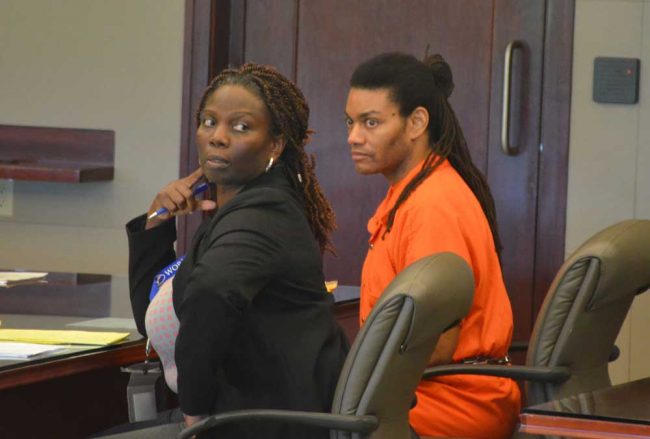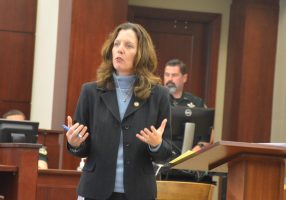
Victor Eugene Williams is 43 and used to live on Big Bear Lane in Palm Coast. A year ago today, he picked up a 16-year-old Palm Coast boy who’d found him on Grindr, a popular hook-up app for the LGBT community. The boy had met Williams once or twice before for drugs and alcohol.
This time, they drank so much that the boy got drunk. The boy had also had some Xanax, the anxiety narcotic, and cocaine. (Detectives later found Xanax pills and 14 grams of cocaine in Williams’s possession.) Williams and the boy had sex. The boy’s step-father later found the boy passed out at the entrance to the boy’s home. He snapped a picture of him and sent it to the boy’s mother. The boy’s behavior had been an ongoing issue.
None of that is in dispute. Williams admitted to the sex. The sequence of events is based on the account described by his attorney, Assistant Public Defender Regina Nunnally, in court Monday. The Xanax, along with cocaine, was detected in a blood test that’s part of the court file.
After the boy revealed the encounter to his mother, his mother located Williams, he was arrested and charged with rape. On Oct. 4, Assistant State Attorney Melissa Clark, who is prosecuting the case, filed two counts against Williams: sexual battery by a person 18 or older on a child between 12 and 16, a first degree felony punishable by life. And Unlawful sexual activity with a minor, a second degree felony.
In January, Clark added a third charge: Uninformed HIV infected sexual intercourse, a third-degree felony. Williams was infected with HIV at the time of his encounter with the boy. It is illegal for an infected person to have sex with someone without disclosing one’s HIV infection. Williams is disputing that he never told the boy. He claims they had a conversation about it when the boy told him of other escapades, one of them to Indiana, and that Williams told him he had to be careful since he was himself infected by being careless.
It is the first Flagler case in memory with such a charge. There were 874 HIV-related arrests in Florida from 1986 to 2017, according to UCLA’s Williams Institute. The charge does not require actual transmission of HIV to be leveled. Only 35 percent of those arrested were convicted on the HIV-related charge. Another 20 percent were convicted on non-related offenses.
In Williams’s case, the charge pales in comparison with the two other charges he faces when he goes to trial in October–assuming he doesn’t agree to a deal before then. After Monday’s hearing, he might well do so (assuming a state offer is on the table), because his path to outright acquittal was all but closed by Circuit Judge Terrence Perkins’s customarily narrow reading of what his lawyer may permissibly argue in his defense, and what she may not.
On Monday, Clark and Nunnally faced off over a series of pre-trial motions, the last steps before trial. The judge’s rulings on the motions establish the ground rules for trial: what evidence may be introduced, what evidence may not.
Nunnally, for example, sought to maximize the amount of information she could use at trial to show, or at least argue before the jury, that the boy’s credibility is allegedly in question, his promiscuity documented beyond his encounters with Williams–such as his own admission of the trip to Indiana and his use of Grindr–and to include evidence of the DNA of a man other than Williams or the boy on the boy’s clothing (“that in itself is a contradiction to his testimony and a conflict,” Nunnally said). One of the defense’s motions made it explicit, calling for “Any scientific or medical report that tends to establish the innocence of [Williams], or to impeach the credibility or contradict the testimony of any witness whom the State calls.” The motion also called for “Any and all records and information showing prior misconduct or bad acts committed by” the boy.

Nunnally is trying to demolish the credibility of the boy and, in Clark’s characterization, “smear” his reputation. Nunnally is trying to demolish the prosecution’s claim that the boy was “ravished.”
But Perkins at the very beginning of the hearing asked a key question: “Can a 16 year old consent with sex with a 40-year old?”
The answer under Florida law is an emphatic No. There are no mitigating circumstances, as there may be when the partner is not an adult. It is irrelevant whether the boy had sex before, or with however many partners. Florida’s rape-shield law makes all those elements inadmissible at trial. Since Williams has admitted to the sex, it is also irrelevant whether the boy’s credibility is in question. There’s no room in his defense to claim that the sex did not happen.
Williams insists that the boy portrayed himself as an 18-year-old. In fact the boy would have had to lie to use Grindr, which is prohibited to minors (though minors use it just as Facebook, which also has an age cut-off, is used by children). And there’s no question that the boy was to some degree a “willing participant,” as the judge put it. But under Florida law that too is irrelevant. It is also irrelevant what the adult thought the age of the child was in a sexual encounter, or what subterfuges the child carried out to pass himself off as an adult. It is still the adult’s responsibility to know that the person is of age, and to not have sex with a minor. No exceptions.
So with so much stacked against him, why is Williams bothering with trial?
One reason defendants do so is when they feel they have nothing to lose, including money, when they’re represented by a public defender. In this case, Williams appears to be playing for convictions on lesser charges. Consent, for example, does play a role, even when a child is involved, when the accused faces a first-degree felony rape charge. If Nunnally can show consent, the sex is still illegal, but then the jury could go with statutory rape, or unlawful sex with a minor–the second degree felony that immediately drops Williams’s potential prison time from life to a maximum of 15 years, and possibly less, when probation and other factors are taken into account.
That, in fact, was where much of Monday’s battle over motions centered. The more Nunnally can undermine the credibility and reputation of the boy, the greater the chance of pushing the jury toward a conviction on lesser charges.
In sex-assault trials, lawyers never hesitate to blame the victim. The law and presiding judges raise numerous obstacles in the way of lawyers who try. So lawyers have to find subtle ways to blame the victim anyway, within the given parameters. In this case, Nunnally skirted disturbingly close to making the victim seem like the predator–a risky strategy that may work with a jury prone to latent prejudices, but that may also backfire with a jury that, like the law, takes gender prior behavior out of the equation and strictly focuses on deeds and ages in the case at hand.
“We do not want the jury to come to the conclusion that the only reason he knows what he knows is because of Mr. Williams. That is not true,” Nunnally argued on Monday. “He did not go looking for this young man, this young man was looking for someone like him. These types of cases believe it or not, they want to believe the alleged victim.” She cited the boy’s use of Grindr, an app he’d been using for a year by then, according to court documents, but to get adult men to give him alcohol and drugs, Nunnally argued. “That’s how Mr. Williams met him, and that’s how that occurred, and when he went over there that night, that’s what it was for even though the young man says it wasn’t,” Nunnally said.

(© FlaglerLive)
“Really what they’re trying to get out is that this is a promiscuous young man,” Clark told the judge. She agreed that the defense could refer to the boy’s use of Grindr, but not to the history of the use of Grindr. Only to the extent that it applies to the Williams situation. “That is appropriate and it’s relevant, but I don’t think it’s appropriate for them to get into the victim having used it to hook up with other males,” Clark said. The judge agreed.
Nunnally also portrayed a boy who, based on what he told a nurse examining him for a sexual assault kit, knew what he was into. The prosecution wants to use the fact that he bled afterward and suffered pain as an indication that the sex was not consensual. Nunnally counterargued with an eyebrow-raising claim: “He did say that was something that had happened before because of past sexual activity with another person,” Nunnally said. “That’s a normal byprodct of homosexual activity.” (A medically informed witness would argue the word normal).
She then sought to go into the boy’s history with his family–his battles with his mother and stepfather indicating a “pattern” of defiant and untruthful claims, including in the hours after the boy’s encounter with Williams. “That’s one incident on top of other incidents,” Nunnally said. “It looks like it’s an ongoing problem in that family. They would treat him shitty, that’s his words.” As a result, Nunnally argued, revealing a central claim of her opening argument to the jury, the boy initially covered up his encounter with Williams, and when, some 12 hours later, he realized how much trouble he was in with his parents, he came up with the claim that he’d been raped.
“The motivation is to get out of trouble,” Nunnally said, arguing for the inclusion of “prior acts,” of him sneaking out often and trying to avoid trouble with his parents. Nunnally says it worked: “She’s pissed off,” she said of the boy’s mother (who will also be a witness), “she’s mad and she wants to go to war with my client.”
Again, Clark conceded that with regards to the incident with Williams, the sneaking out and the issues with the family are “fair game,” particularly as it applies to the way the day unfolded after the encounter between Williams and the boy. At one point the boy was “crying and screaming in the bathroom,” Clark said, when the boy discovered he was bleeding, and that’s when he tells his mother he was “drugged and raped,” and that his “insides felt weird.”
Beyond that day, the boy’s history should be off limits, Clark argued. The judge agreed.
Nunnally also claimed that going into the boy’s sexual history was necessary because he claims Williams never put him on notice about his HIV status, when in fact they’d had a conversation about it. The judge agreed only to allow the boy to be cross-examined about what Williams told him about HIV–but not about what the boy had done before that prompted Williams to speak of his HIV status.
The judge set the same standard regarding the boy’s use of alcohol and drugs.
“They would use that just to smear this young man, to make it look like he’s a bad kind, makes bad choices,” Clark said, reciting a list of drugs the boy had used in the past. “It’s not relevant.” The judge ruled that in so far as the encounter with Williams is concerned, the boy may be asked what he had and how it made him feel. But no questions may be asked about prior use.
Docket sounding is on Oct. 1. That’s when the actual date for the trial will be set, likely for later that month. Meanwhile, Williams remains at the Flagler County jail, where he’s been held on $108,000 bond for what will be a year on Friday.





























steve says
Good Riddance
Tom says
I hope he is condemned to death
Outside Looking Out says
Given Flagler county’s and Judge Perkin’s “sex is not a crime” attitude, I’m sure he has nothing to worry about. If a man can commit rape toward an autistic child and get probation, I’m sure consenting participants, even though one is a child, will get off very lightly.
WILLIAM J NELSON says
Do Not Fear!! With Perkins involved, he (Williams) will probably get probation for a month and everyone else in the City of Palm Coast can worry about their Children. What a travesty for a JUDGE !!
Palm Coaster says
Judge Perkins will give him a slap on the wrist. Next election he needs to be voted out.
Name says
This planet is so weird. What’s wrong with you people?
ASF says
Let me guess: Regina Nunnally is hoping to become one of Flagler County’s famous “Let ’em off with less than a slap on the wrist” judges one day.
Karma is the ultimate judge.
Forgotten says
Ever wonder why these criminals are getting such sweet deals? It is NOT Judge Perkins, it rest squarely on the plea deals offered. And why are there so many? Well if you’re a victim, do you want to be accused, shamed, endless delays so the accused can get all the tax payer funded resources to explain their behavior. No one will stand up for you. You will not have a free attorney representing you and once untrue accusations are made by public defenders in court, they are printed as truth. So tell me do you want to go through that? And rest your hope on a jury? Or do you just want some sort of a sure punishment no matter how light?
It’s repulsive, Nunnally is resorting to the only thing she uses “smear” “shame” and point the finger at the victim. Why?
There will be a deal in this one.